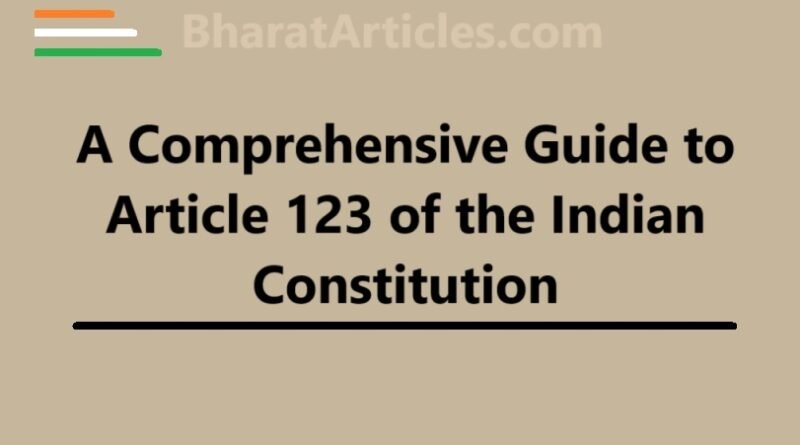A Comprehensive Guide to Article 123 of the Indian Constitution
Introduction
The Indian Constitution provides legislative powers to both the Parliament and the President of India. While legislative powers primarily rest with Parliament, the President is empowered to promulgate ordinances under Article 123 when Parliament is not in session. This article explores the provisions, significance, limitations, and judicial interpretations of Article 123.
Understanding Article 123
Article 123 of the Indian Constitution grants the President the power to promulgate ordinances when immediate legislative action is necessary. The provision states:
Text of Article 123:
- If at any time when both Houses of Parliament are not in session, and the President is satisfied that circumstances exist that render it necessary to take immediate action, he may promulgate such ordinances as the circumstances appear to him to require.
- An ordinance shall have the same force and effect as an act of Parliament but must be laid before both Houses when they reassemble and shall cease to operate at the expiration of six weeks from the reassembly of Parliament unless disapproved earlier.
- The President may withdraw an ordinance at any time.
Key Features of Article 123
- Legislative Power of the Executive: Article 123 allows the President to exercise legislative power in extraordinary situations.
- Temporary Nature: An ordinance remains valid for a maximum of six weeks after Parliament reconvenes unless it is either approved or disapproved earlier.
- Ordinance vs. Parliamentary Law: An ordinance has the same legal standing as an act passed by Parliament but is subject to parliamentary review.
- Withdrawal of Ordinance: The President can withdraw an ordinance before its expiry.
Conditions for Issuing an Ordinance
For an ordinance to be valid:
- Parliament must not be in session (either one or both Houses should not be convened).
- The President must be satisfied that there is an urgent need for legislation.
- The ordinance should not contravene the fundamental rights or the basic structure of the Constitution.
Judicial Review and Landmark Cases
While Article 123 grants the President discretionary power, courts have laid down certain limitations:
- R.C. Cooper v. Union of India (1970): The Supreme Court held that the President’s satisfaction regarding the necessity of an ordinance is subject to judicial review.
- D.C. Wadhwa v. State of Bihar (1987): The Court ruled that repromulgation of ordinances without placing them before the legislature amounts to a fraud on the Constitution.
- Krishna Kumar Singh v. State of Bihar (2017): The Supreme Court emphasized that ordinances are not a substitute for legislation and must not be used excessively.
Limitations and Criticism of Article 123
- Ordinance Raj: Frequent and repeated promulgation of ordinances can undermine the legislative process and democratic principles.
- Executive Overreach: The power may be misused by the executive to bypass parliamentary scrutiny.
- Judicial Restrictions: Courts have limited the scope of ordinance-making powers through various judgments.
- Lack of Public Debate: Ordinances are enacted without detailed discussions, reducing legislative transparency.
Comparison with Governor’s Power under Article 213
While Article 123 empowers the President, Article 213 grants similar ordinance-making power to Governors for state legislation, subject to approval by the President in certain cases.
Conclusion
Article 123 serves as an emergency legislative tool, allowing governance to continue efficiently when Parliament is not in session. However, the provision must be exercised judiciously, ensuring it does not replace the democratic law-making process. Judicial pronouncements have played a crucial role in curbing misuse, reinforcing that ordinances should only be used in exceptional circumstances.


Pingback: A Clear Explanation About NOTA (None of the Above) - Bharat Articles